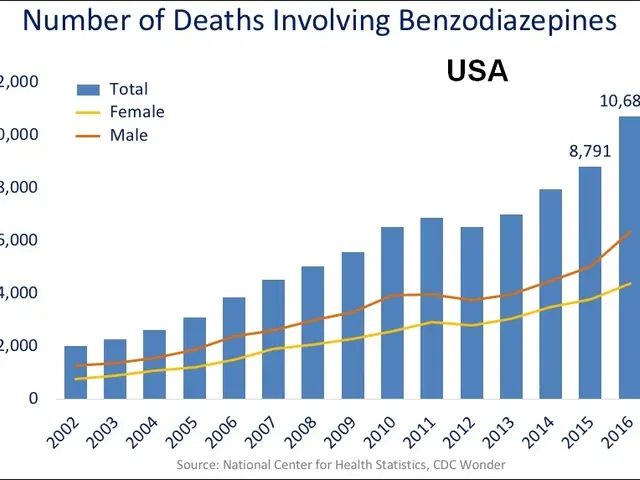Unraveling Mental Distractions Specific to Adult ADHD: Racing Thoughts vs Mind Wandering
In a recent study, researchers have shed light on the unique cognitive experiences of racing thoughts and mind wandering in adults with Attention Deficit Hyperactivity Disorder (ADHD). The findings have significant implications for understanding and treating mental restlessness in adult ADHD, particularly in relation to emotional dysregulation.
Racing thoughts, a symptom characterised by the brain feeling "in overdrive," rapidly jumping from one worry or idea to the next without pause, is often linked to hyperactivity and anxiety comorbidity in ADHD. This symptom can lead to frustration or difficulty slowing down cognitive processes, contributing to emotional dysregulation, overthinking, and difficulty completing tasks. Mind wandering, on the other hand, is characterized by spontaneous distraction by one’s own thoughts rather than external stimuli. It occurs frequently in the inattentive ADHD subtype and manifests as "spacing out" or mentally checking out, often involuntarily.
The study found that racing thoughts correlate with hyperactivity and anxiety symptoms in ADHD, while mind wandering is more linked to inattentive symptoms. Racing thoughts were found to predict emotional lability, aligning with previous research, and were found to exacerbate ADHD-related functional impairments, such as task procrastination and emotional distress. Mind wandering, however, was not significantly associated with ADHD symptoms or functional impairment.
The strong association between racing thoughts and functional impairment suggests that addressing racing thoughts could be a valuable treatment target in ADHD. The study used a factor analysis to distinguish between racing thoughts and mind wandering and included a relatively large sample of adults with ADHD diagnosed by experienced clinicians. The study also used validated measures for assessing racing thoughts, mind wandering, and ADHD symptoms.
However, the study is not without its limitations. Reliance on self-report measures, lack of comparison groups, cross-sectional design, and sample recruitment from a single clinical setting are some of the limitations that need to be considered.
Future research could explore the neurobiological underpinnings of racing thoughts in ADHD, investigate potential interventions targeting racing thoughts, and examine how racing thoughts interact with other ADHD symptoms over time. The results of this study provide a crucial step towards a better understanding of the cognitive experiences in adult ADHD and pave the way for more targeted and effective treatments.
- The unique cognitive experiences of racing thoughts and mind wandering in adults with Attention Deficit Hyperactivity Disorder (ADHD) are attracting considerable research interest, as these phenomena have significant implications for understanding and treating mental restlessness in adult ADHD.
- Racing thoughts, characterized by the brain feeling "in overdrive," are often linked to hyperactivity and anxiety comorbidity in ADHD, contributing to emotional dysregulation, overthinking, and difficulty completing tasks.
- On the other hand, mind wandering, characterized by spontaneous distraction by one’s own thoughts rather than external stimuli, occurs frequently in the inattentive ADHD subtype and manifests as "spacing out" or mentally checking out, often involuntarily.
- The study found that racing thoughts correlate with hyperactivity and anxiety symptoms in ADHD, while mind wandering is more linked to inattentive symptoms, and that racing thoughts predict emotional lability and exacerbate ADHD-related functional impairments.
- Addressing racing thoughts could be a valuable treatment target in ADHD, as the study revealed a strong association between racing thoughts and functional impairment.
- Future research is warranted to explore the neurobiological underpinnings of racing thoughts in ADHD, investigate potential interventions targeting racing thoughts, and examine how racing thoughts interact with other ADHD symptoms over time, to provide a comprehensive understanding of mental health and wellness in adulthood.
- Advances in science, psychology, and health-and-wellness fields will help uncover more about the cognitive experiences in adult ADHD, leading to more targeted and effective treatments for mental health disorders.





